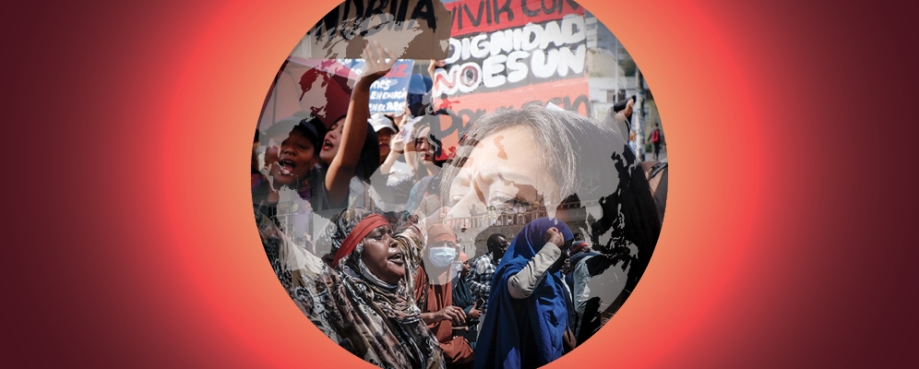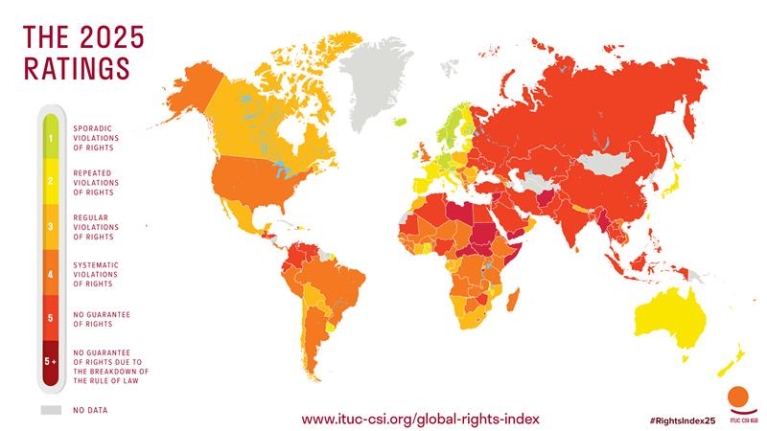
This year’s 2025 ITUC Global Rights Index paints a grim picture of our world. Workers’ rights - the cornerstone of social justice and democracy - are under sustained attack. Yet in the face of repression, working people continue to organise and win. These victories show what is possible when workers are empowered.
Now in its twelfth edition, the Global Rights Index is the only database of its kind. It ranks 151 countries based on 97 indicators derived from International Labour Organization (ILO) conventions and jurisprudence. It measures the degree of respect for workers’ rights, scoring countries from 1 (best) to 5+ (worst), based on data gathered from April to March each year.
This edition shows that workers’ rights are in free fall across every continent:
- Only seven out of the 151 countries earned a top-tier rating of 1 – down from 18 a decade ago. If the current trend continues, no countries will hold a rating of 1 within the next ten years.
- Three out of five global regions saw conditions worsen; the Americas (3.68) and Europe (2.78) hit their worst scores on record. Europe continued a rapid deterioration from 1.84 in 2014 – the biggest decline seen in any region worldwide over the past 10 years.
- The 10 worst countries for workers are: Bangladesh, Belarus, Ecuador, Egypt, Eswatini, Myanmar, Nigeria (NEW), the Philippines, Tunisia, and Türkiye.
- The worst region in the world for working people is the Middle East and North Africa, with an average rating of 4.68.
- Deaths of trade unionists were recorded in Cameroon, Colombia, Guatemala, Peru, and South Africa.
- 87% of countries violated the right to strike; 80% violated the right to collective bargaining.
- Workers’ access to justice was restricted in 72% of countries, the worst level ever recorded.
Behind these statistics are people - workers who face harassment, arrest, imprisonment, and death simply for standing up for their rights.

The Index is not only a snapshot of violations, but a warning signal. It shows that the rights of working people are being systematically dismantled, driven by authoritarian regimes, far-right ideologies and billionaire-backed elites whose interests lie in silencing dissent.
This is not only a crisis for working people - it is a crisis for democracy itself. Labour rights are human rights. From Argentina to Finland, Morocco to Nigeria, when governments repress unions, they repress democratic participation. When workers are denied a voice, democratic values erode. The fates of democracy and trade unionism are intertwined. You cannot have one without the other.
One particularly disturbing development is the spread of so-called “foreign agent” laws. Framed as tools of national security, these laws are used to label unions and civil society organisations as foreign threats. They ban international funding, enable surveillance, and criminalise international cooperation. In Hong Kong, unionists now face up to 20 years in prison for simply sharing information with global allies. Similar laws are being introduced or expanded in India, Kazakhstan, Uganda and Kenya.
Organise, resist, win
But amid this repression, there is also resistance and success. In Indonesia, unions overturned parts of a regressive Omnibus law. In Côte d’Ivoire, DHL workers secured union recognition after years of organising – helped by Germany’s 2023 due diligence law. In Ghana, a mining licence was revoked following union-led action. These victories are proof of what is possible when workers are empowered to act collectively.
Trade unions are the largest democratic force in the world, not relics of the past. They promote equality, improve workplace safety and hold power to account. But their success depends on their ability to operate freely.
We understand that the global decline in labour rights is no accident. It is the result of political choices made to favour profit over people. But we can make different choices.
The ITUC’s “For Democracy that delivers” campaign calls for respect for trade union rights at work, in society and globally to build democratic societies that reflect the real interests of working people: decent work, fair wages, social protection and rights.
The same global economy that allows supply chains to span continents must also carry solidarity and ethical responsibility. Companies that benefit from international trade must not turn a blind eye to repression in their supply chains. Governments must not excuse abuses in the name of economic growth. Civil society must speak out when freedoms are curtailed.
Let me end with this: the 2025 Global Rights Index is not a declaration of defeat - it is a rallying cry. Across the world, from Mauritius to Canada, workers are fighting back. They are organising, building power, winning rights and rebuilding democracy
We must all join the struggle. If you are a worker, join a union. If you are an employer, respect the voice of labour. If you are a policymaker, protect the right to organise. And if you care about democracy, stand with working people.
